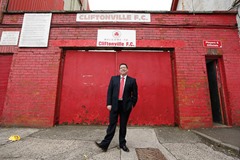Champions
 Cliftonville were this year’s runaway winners of the Irish Football League. Gerard Lawlor, the club’s Chairman, talks to Owen McQuade about the club’s success and its future plans, both on and off the pitch.
Cliftonville were this year’s runaway winners of the Irish Football League. Gerard Lawlor, the club’s Chairman, talks to Owen McQuade about the club’s success and its future plans, both on and off the pitch.
“I think it’s only now that it’s really settling in,” Gerard Lawlor comments as he reflects on this year’s winning of the Irish League: Cliftonville’s first since 1998.
It was only when the North Belfast club beat Crusaders at Solitude on Boxing Day and went 12 points clear at the top of the league that he really started to believe that they had a genuine chance to win. After that, it was “a one game at a time” approach.
It was particularly satisfying to see his team to be confirmed champions in front of their home crowd against arch-rivals Linfield. He recalls: “At 2-2 with two minutes to go, I was sitting beside the Chief Executive of the IFA in the directors’ box and I said to him: ‘There’s a goal in this game yet.’ And he said: ‘Yeah, it’s not going to be today for you though.’”
Then George McMullan – “a lad from the Markets who has given his all for this club over the last 10 years” – scored a 92nd minute penalty and “to win the league against Linfield in front of the cage, it’s just dreams come true.”
Success
Lawlor finds that “Cliftonville is an institution in North Belfast that means so much to people who have an affiliation with the club.” In recent years, the board’s one mission has been “basically to keep Cliftonville off the front pages of the local newspapers and keep it to the back pages.”
Like many football clubs, Cliftonville has “battled” debt over the last seven years. Some board members have missed out on family holidays for three or four years, all to invest in keeping the club afloat and “going in the right direction.”
“We don’t pay big wages but we have a lot of guys who want to play for the club,” he explains. Cliftonville has adopted a GAA mentality by taking on locally-based players or players who come to the club and understand what Cliftonville means to the community. Lawlor comments: “Someone described it to me last week: ‘It’s more than just a club.’ And I think our players at this moment in time have really, really bought into that.” Although the club only pays what it can afford to pay its players, he says: “We’ll never let them down and they’ll get their wages every week.”
Success has not been built on money but rather won by a “group of lads who have a mighty talent” for football. “Some of the stuff that they played last year was breath-taking at times,” he remarks. “They have really enhanced the game and I think now we have a grown a reputation for being a good footballing side with a respectable club, and I think that all just gelled together for us last year.”
Alongside the financial rewards of winning the league, Cliftonville has secured a Champions League draw against Glasgow Celtic and Lawlor received a letter from Sir Alex Ferguson and an email from Bayern Munich Chairman Karl-Heinz Rummenigge.
Changes
When he took over as Chairman four and a half years ago, there was an “element of divisiveness” between the board, players, staff and supporters, as happens in many clubs.
“My one objective was to bring everybody together and to break down all the barriers,” he outlines. “We’re now all one big team and I think togetherness has been the key to our success.” Lawlor sees the culture of the club as being about “openness and honesty: we are what we are.”
No prima donnas are allowed: “It’s just one commitment from a group of people to bring a sporting brand within North Belfast to the fore.”
Keeping politics out of sport is “difficult” as shown by the flag protests at the Crusaders v. Cliftonville game in the last season. “We’ve just got to get on with it,” he says. Northern Ireland politics aside, sporting organisations are often rife with politics with a small ‘p’. 4
“There’ll always be a bit of jealousy here and there,” he replies, “but, I have to say, we overcame it and I keep going back to the GAA model where it was always that parish mentality that we want to succeed as a group of people. And that’s the ethos that we always use behind it and, I have to say, this year the togetherness was really unique throughout the club.”
Winning the title has broken Linfield’s dominance and, he believes, given hope to other clubs. Lawlor adds: “I believe the standard of football and the product that we offer is fantastic at a very reasonable price.” The club intends to fully renovate its grounds, half of which have been refurbished, and make them more welcoming to families and women.
Twenty-three per cent of spectators are now women: a big achievement alongside a 70 per cent increase in crowd numbers over the last five years.
Supporters had drifted away from the game because of sectarianism in local football and poor team performances. They now “want to be associated with success.”
That said, Lawlor finds local football in an “extremely worrying” state. “The game’s at a crossroads in my opinion,” he comments. Clubs like Clintonville and Ballinamallard, from County Fermanagh, are now coming through but, speaking personally, he thinks that there are too many teams in the Premier League.
“We have 12 teams in the Premier League and I don’t think there’s enough talent within the country to have a high standard of football with so many teams,” he states. After a decade of investment, the league has “come to a standstill” in investing in infrastructure: “We need just a wee bit of revitalisation to rejuvenate our energies a little.”
Challenges
When asked about the challenges of running a football club in today’s economic climate, he says the largest one is cash flow.
“You have to be very careful in your management of your cash flow,” he comments. “Sometimes, you mightn’t have a home gate for three or four weeks, then you can have three in a row. Budgeting’s very important to us in running the business.”
However, Lawlor says that the football business is different to other businesses. “The difficulty kicks in a little bit in that I am a fan,” he explains. “I want to win. I want to have the best players. I want the manager to have the best tools that he can get his hands on but we have got to do it within a budget.”
Cliftonville’s philosophy is very much: “If you can’t afford to pay for it, you don’t buy it.” The club wants to continue to grow as a brand and an institution and attract new fans. While everybody wanted something to be associated with Cliftonville in April and May of this year, the last season was not all plain sailing.
“At the start of this season, we had no sponsor for three months and actually played with nothing on our shirts, and luckily Sean Grahams came on board in October-time,” he recalls. “I’ve probably turned down three or four shirt sponsors in the last number of weeks but we’ll stay loyal to what we have at this stage.”
Another aspect on which Lawlor and the board want to focus is the opening of the club’s facilities to the community throughout the week. Solitude used to lock up at six o’clock on a Saturday evening once a fortnight and then open again a fortnight later at one o’clock or two o’clock in the afternoon.
“At Cliftonville, it’s our vision to become the focal point of the community in North Belfast,” he remarks. The board’s ultimate dream is to have a building open for mothers and toddlers from 9am or 10am, through to after-schools clubs, training and coaching in the afternoon and community bingo in the evenings.
“North Belfast is in the news all too often for the wrong reasons and I think we have over the last number of years given something back to that community and given that community a sense of belief in themselves,” he comments. All too often, the club wanted people to “come and follow us.” The club is now turning that thinking on its head as serving the community will bring more supporters on board.
As for the board’s future plans, the main objective is to clear the debts. When it took office, the club had debts of around £800,000 and it now aims to be debt-free by the end of the summer.
“Achieving Champions League qualification this year has been fantastic in the rewards that that brings,” he says. “The club now has made a profit year-on-year for the last five years. Cliftonville is now a thriving, profitable business so it’s just to get over that final hurdle: that has been our one long-term objective.”
The board also planned to hold a strategic planning day to consider how it could build function rooms into the two sides of the ground still to be developed. This could help to realise yet another dream for the club i.e. a small-scale version of Celtic Park or Old Trafford with the facilities for conferences, weddings and christenings.
“It’s ultimately looking at other arms of the business that can generate income but at the same time working hand-in-hand with their match day experience and improving that,” Lawlor outlines. “Where someone can come along, have a meal on a Saturday, bring your children, feel comfortable and enjoy a game of football.”
Profile: Gerard Lawlor
Aged 38, Gerard grew up in Carrick Hill and started coming to Cliftonville when was 17 after working with a supporters’ club member in his first job. He has been on the board for 11 years and became Chairman aged 33: “I think at the time I was the youngest Chairman in the Irish League.”
He is married to Roisin with two children: Gerard and Seanna. “Roisin’s as big a supporter as I am,” he remarks. “She’ll help out on match-days, do the food in the boardroom and make tea, and my young boy does ball-boying.” His day job is house manager in the Grand Opera House. Gerard remains a follower of Manchester United but Cliftonville and family take up m







